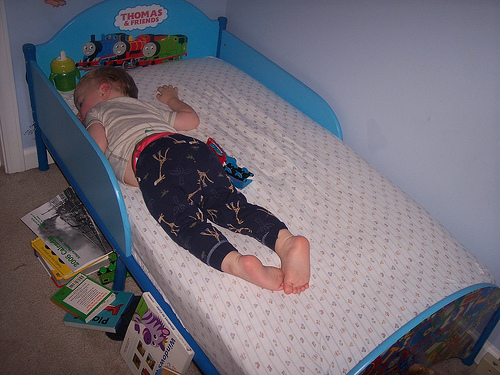Help - My Kid Won't Sleep!

One of the surest ways to lose your mind is having a child who won't go to bed, or gets up multiple times a night. It's easy to lose your patience and get angry with the child, which only makes the situation worse. Use these tips to establish a bedtime routine, identify typical sleep issues in children, and spot any potentially serious sleep problems.
Get a Routine
Establishing a consistent bedtime routine is one of the best things you can do to ensure a restful night's sleep for the whole family. In my experience the schedule is a lot less important than the routine. It doesn't matter so much what time you send kids to be as much as the ritual you perform on the way.
The usual before bed grooming and tucking in, performed over time, create a powerful psychological state of security and calm. First we brush our teeth, then we read a story, then we turn out the light. Make the things you do personal to the child. Create special customs or inside jokes to share with your child again and again.
Whatever your routine, stick to it. The predictability is in part what lulls your child to sleep. (By the way, the same works for you. If you find yourself suffering insomnia, try working on your before bed routine)
The Bed Makes a Difference
I'm not going to weigh in on whether or not you choose to co-sleep with a baby or child. The important thing is that whatever you decide, the child sleeps in the same bed every night. It's not fair to allow kids to sleep with Mom and Dad sometimes, but not others. In a shared custody situation, it helps to have sleeping arrangements as similar as possible at both of the child's locations.
Tips to Decrease Insomnia in Children
- Keep to a consistent bedtime and waking
- Expose the child to 30 minutes of bright light soon after awaking
- Keep the lights dim the lights 1-2 hours before bedtime
- Avoid naps
- Avoid reading and watching TV in bed
- Restrict stimulants like soda pop and chocolate
- Limit heavy liquids big meal right before bed
- Avoid physical exertion for 2-3 hours before bedtime
Rule Out Something More Serious
If you have tried all of the above tips and your child is still having trouble going to bed, falling asleep, or staying asleep you may need to consult your pediatrician. While some nightmares are common, you'll want to know if your child is suffering night terrors and adjust accordingly.









